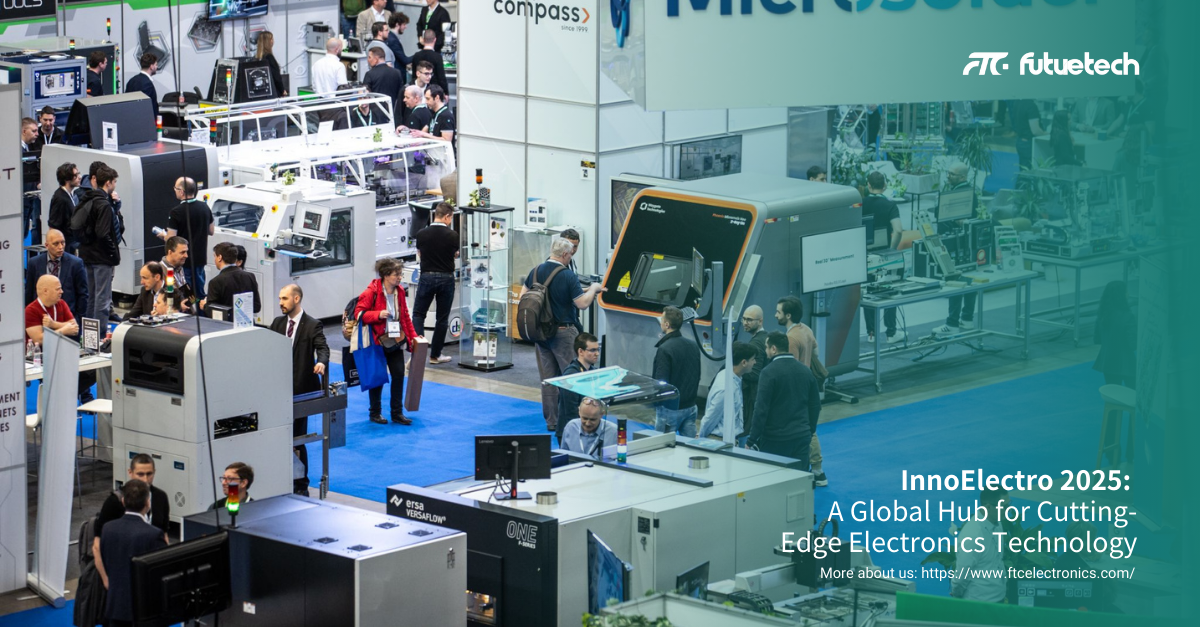From April 8–10, 2025, InnoElectro returned to the Budapest Congress and Exhibition Center, bringing together the latest innovations in the electronics industry. As one of Central and Eastern Europe’s most influential electronics trade shows, the event attracted over 300 exhibitors and more than 18,000 visitors from 30+ countries, covering 15,000 square meters of exhibition space. InnoElectro has grown into a key platform for showcasing global innovation and fostering cross-border cooperation in the electronics sector.
Next-Gen Chips and Component Innovation on Display
One of the major highlights of InnoElectro 2025 was the concentration of breakthroughs in chips and critical components. Semiconductor manufacturers from Germany, France, the US, Japan, and local Central European firms presented their latest developments in analog ICs, power management chips, high-speed interfaces, microcontrollers (MCUs), sensors, and embedded modules.
Key participants included:
● Infineon Technologies, which unveiled its latest power semiconductors and automotive ICs, targeting next-gen EV platforms;
● Microchip Technology, showcasing ultra-low-power embedded solutions for industrial IoT applications;
● Local innovators such as AElectronics Hungary and Tungsram Innovation, who demonstrated regionally customized sensor and integration modules.
Leading distributors like Future Electronics, TTI, and Rutronik brought a comprehensive portfolio of passive components, connectors, optoelectronics, and RF solutions, highlighting their strengths in technical support, logistics efficiency, and factory-direct sourcing.
Focus Topics: The Intersection of AI, Robotics, and Automotive Electronics
With the theme "Smart. Green. Connected.", InnoElectro 2025 spotlighted six major innovation sectors: artificial intelligence (AI), humanoid robotics, low-altitude aviation, automotive electronics, renewable energy, and advanced semiconductor packaging.
AI acceleration chips and edge computing platforms generated significant buzz. Many exhibitors showcased neural processing units (NPUs) and heterogeneous computing systems that empower intelligent devices with real-time decision-making capabilities. In the robotics sector, companies like KUKA and Fanuc presented robotic arms with multi-degree sensors and adaptive learning controls, driving attention from manufacturers seeking automation upgrades.
Automotive electronics continued to dominate the floor with solutions ranging from automotive-grade SoCs and LiDAR modules to advanced BMS and high-speed in-vehicle Ethernet. Suppliers such as Bosch, Valeo, and select Chinese tier-1 players displayed system-level integrations for autonomous and electric mobility.
Forums & Roundtables: Ideas That Shape the Industry
Over 20 specialized forums and executive panels were held during the three-day event. These sessions offered deep dives into emerging trends and practical solutions across sectors like embedded systems, electronics manufacturing, industrial automation, connectivity, and green energy.
Highlighted sessions included:
● “Future of Manufacturing: From Factory Floor to Edge AI” – focused on embedded AI’s role in operational efficiency;
● “E-Mobility Architecture Transformation” – discussed shifts from distributed ECUs to centralized vehicle computing;
● “Sustainable Design in Electronics” – addressed RoHS compliance, green sourcing, and product lifecycle sustainability.
Roundtable dialogues covered topics like "Strategic Autonomy in the European Semiconductor Supply Chain" and "The Role of Startups in Disruptive Hardware Innovation", creating a vibrant space for collaborative thinking and partnership building.
Hungary: A Rising Force in the European Electronics Ecosystem
InnoElectro’s host country Hungary is fast becoming a strategic hub for electronics production and R&D. Government-backed digital initiatives and infrastructure investment have encouraged multinational companies such as Bosch, Samsung, Huawei, and Continental to establish manufacturing and R&D centers in the region. With increasing local capabilities in PCB fabrication, semiconductor assembly, and intelligent automation, Hungary is gaining traction as a regional powerhouse in electronics value chains.
During the exhibition, the organizers also organized a number of B2B matchmaking meetings and innovative startup roadshows to promote cooperation and integration between small and medium-sized enterprises and multinational giants, injecting more vitality into the industry.
InnoElectro 2025 is not only an exhibition to showcase scientific and technological achievements, but also an important platform for communication and cooperation in the global electronics industry. Whether it is the continuous breakthroughs in chip and device technology, or the integrated innovation of AI, automotive electronics and intelligent manufacturing, it indicates that the electronics industry is entering a new round of high-quality development cycle.

